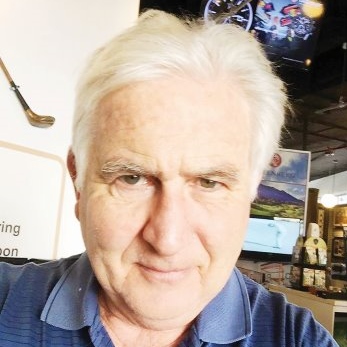click to dowload our latest edition
CLICK HERE TO SUBSCRIBE TO OUR NEWSLETTER


Published
5 years agoon
By
adminLUKE ALFRED
Cohen promoted the book in Durban, Joburg, and Cape Town last week. Wherever he went, the relatives of those he writes about came up to talk. Cohen himself believes it is one of the most important – if not the most important – golf book ever written in this country, detailing as it does the struggles of black, coloured, and Indian golfers in the heyday of apartheid.
Such players, like Ismail “Boy” Chowglay; Sewsunker “Papwa” Sewgolum; Vincent Tshabalala; and the highly regarded Zimbabwean, Lewis Chitengwa, who once beat a young Tiger Woods, were often caddies on suburban courses. With time on their hands, they taught themselves to play, fashioning clubs out of wire, and often experimenting with the unorthodox grips that they subsequently took into tournament golf.
Cohen has written a fascinating, factual, and timely book after being told by mainstream publishers that “sports books don’t sell” and that books about the neglected history of South African sport sell even less. “Having self-published, I’ll be happy if I break even,” he says. “The book tells an important collective story that hasn’t been told before.”
Describing Muizenberg as “a little shtetl” of 250 Jewish families, Cohen grew up playing touch rugby on the Muizenberg beach, and taking trips to the Empire Bioscope where, “if you didn’t have your shilling, you hid in the toilets and snuck in at interval”.
When he was 12, he happened on the Clovelly Golf Club, so beginning a lifelong romance with the sport. The original Clovelly Country Club had been bought in 1932 by Raymond Ackerman’s father, Gus, and Michael Pevsner, with Ackermans and Pevsners alternating as club chairmen and presidents through the years to follow. Their intentions had always been to create an open club, mainly (but not exclusively) for Jews excluded from other Cape clubs like Mowbray and the sniffy Kelvin Grove. For Cohen, it became a home from home.
Shortly after arriving at Clovelly in the mid-1960s, he rubbed shoulders with then club caddy-master, Chowglay, one of the finest left-handed golfers South Africa has ever produced. For Cohen, it was a political awakening. Here was the attractive Chowglay, with his flashing smile and distinctive pointed straw hat, much-loved at Clovelly, but denied opportunity in the world at large because of his colour. Clearly something wasn’t right.
After living in Australasia for 14 years, Cohen returned to South Africa with the advent of democracy. His lifelong interest in golf, racial politics, and history came to fruition when he started a golf museum at Oubaai in 2009. Six years and several incarnations later, the museum relocated to the Cape Town Waterfront, where it also incorporated a hall of fame with a sub-section for “disadvantaged golfers”.
In spite of doing his bit to dramatise the endless petty humiliations of black golfers like Chowglay, Sewgolum, and Tshabalala, Cohen still felt something was lacking. He was sitting on records and stories about black golf that neither the golf authorities nor the media seemed open to. “So I decided on a book – and that was the beginning of Blazing the Trail.”
Not only is Blazing the Trail a history book about golf and the politics of exclusion, it is a book of remarkable stories. There is the (by now famous) story, for instance, of Sewgolum being denied access to the “whites only” clubhouse after winning the Natal Open in 1963, and receiving his trophy outside in the rain.
Few people know, however, that Sewgolum’s mother was blind, and that he lived in a shack, unable to read or write. He survived an assassination attempt at Port Elizabeth in 1966 (a gas pipe in his caravan was severed) and was so feted in India, he was offered the job of course professional at the Royal Calcutta Golf Club – a position he refused. “Not only does the book show these iconic black golfers that might have become champions, but because of Papwa, India had South Africa turfed out of the Olympics [in Tokyo in 1964], and later out of the International Olympic Committee entirely.”
Cohen is also fond of telling a story about Raymond Ackerman presenting himself to BJ Vorster and Connie Mulder in an attempt to have Clovelly Golf Club opened officially to all. Mulder was having none of it, but Vorster over-rode him, telling Ackerman that if 87% of Clovelly members voted “yes”, the club could be opened to golfers of all races.
The 87% threshold – an entirely arbitrary figure, says Cohen – was duly reached, and Clovelly became the first golf club in the country to open its doors to all, a fact about which he is justifiably proud. In a winding way it was the genesis of this remarkable book.
Fencing first for Israel
In a first for Israeli fencing last week, fencer Yuval Freilich (24) became the first Israeli ever to win a title at the European Fencing Championships in Dusseldorf. “It’s the most incredible feeling,” said Freilich, ranked 40th, after beating the 13th-ranked Italian, Andrea Santarelli, to win the gold medal.

Jonathan Pinshaw
Jul 3, 2019 at 11:13 pm
‘An outstanding and important story that should have been written long ago. Well worth reading. Congratulations to the author. ‘